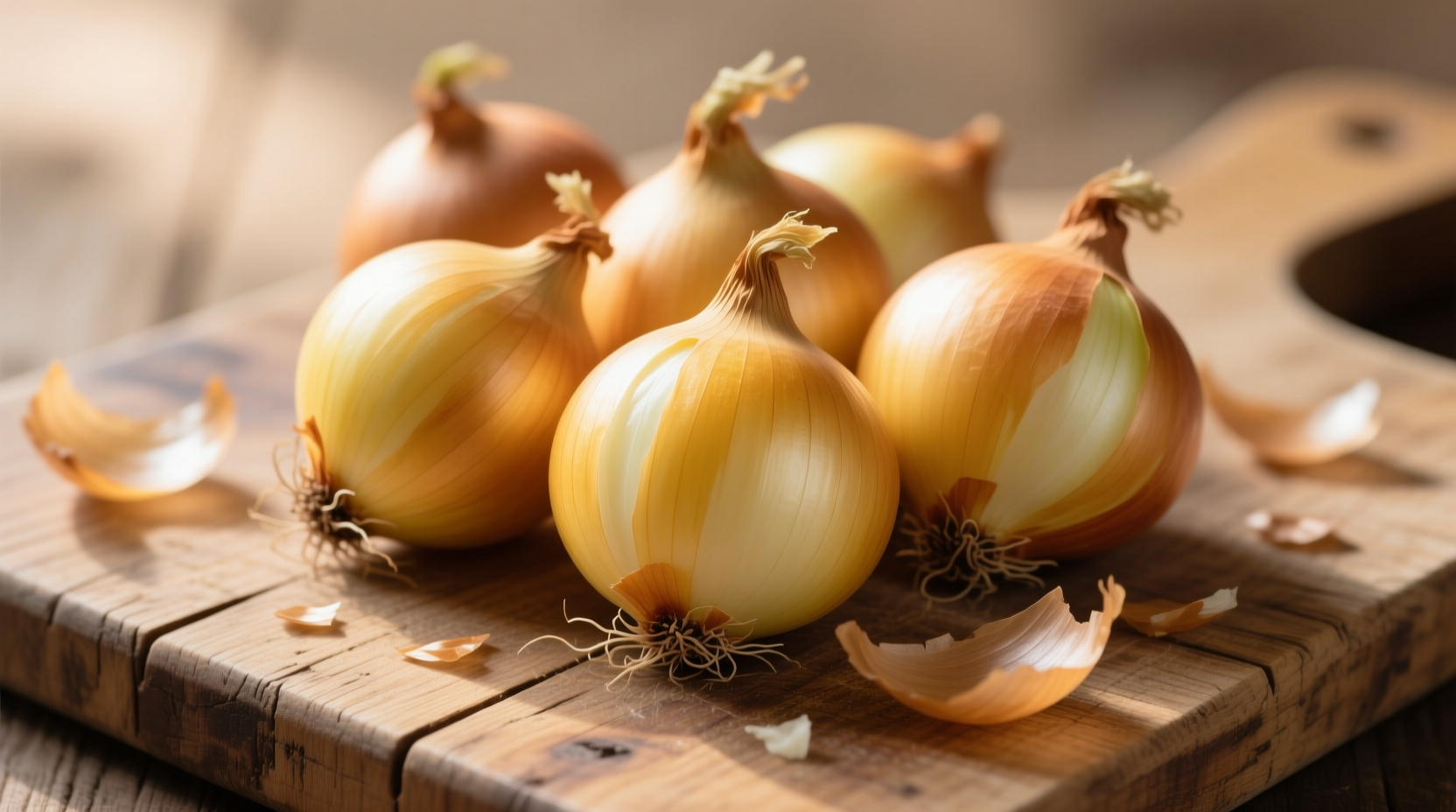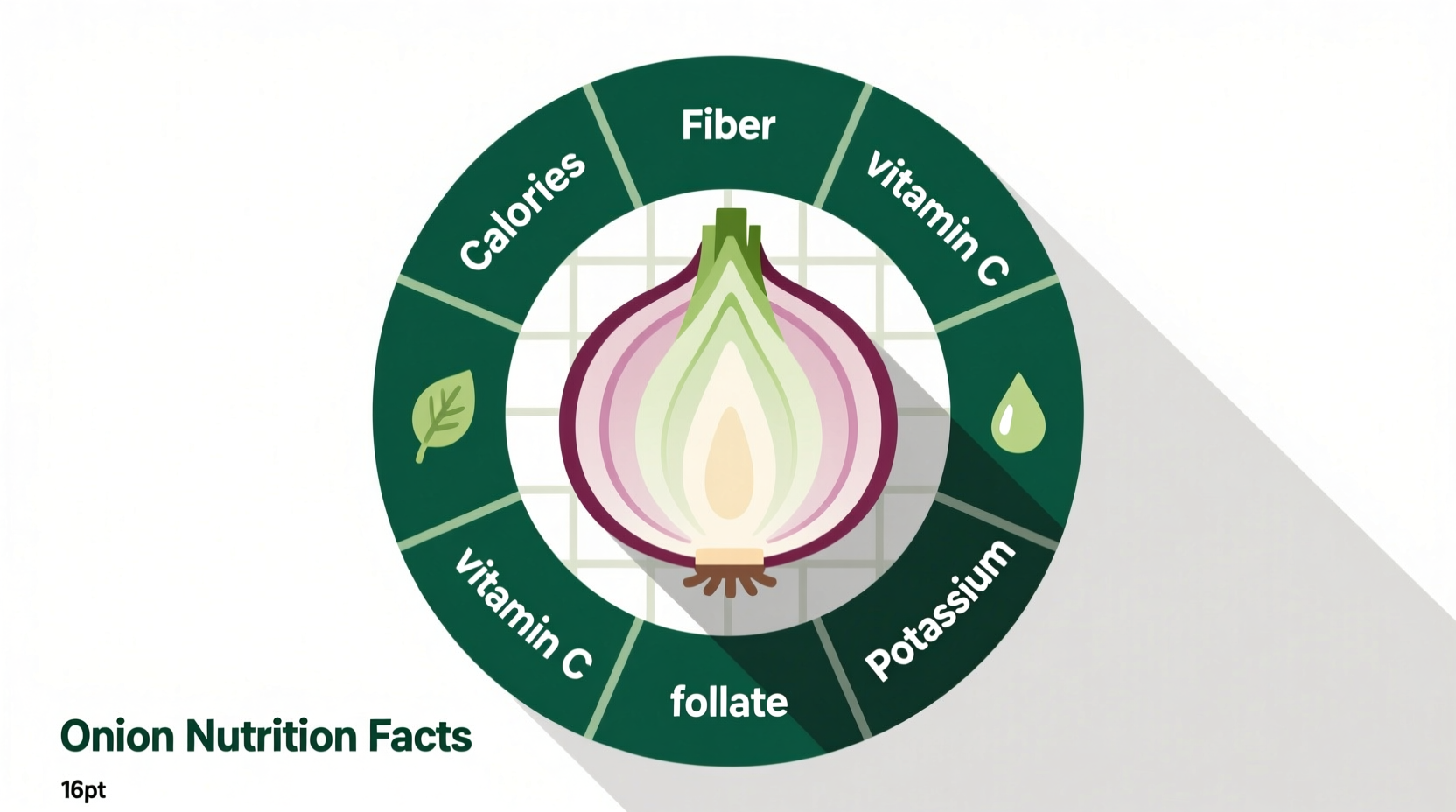Discover exactly how this kitchen staple boosts your health with science-backed nutritional insights you can trust. Whether you're managing dietary restrictions or optimizing your meal planning, understanding onion nutrition unlocks practical benefits for your daily eating habits.
Core Nutritional Profile: What Makes Onions a Superfood?
Onions stand out among vegetables for their exceptional nutrient density. According to the USDA FoodData Central database, a standard 100-gram serving of raw yellow onions contains:
| Nutrient | Amount per 100g | % Daily Value |
|---|---|---|
| Calories | 42 kcal | 2% |
| Carbohydrates | 9.3g | 3% |
| Dietary Fiber | 1.7g | 6% |
| Vitamin C | 7.4mg | 8% |
| Vitamin B6 | 0.12mg | 7% |
| Folate | 19μg | 5% |
| Potassium | 146mg | 3% |
| Manganese | 0.13mg | 6% |
This nutritional powerhouse also contains significant amounts of quercetin, a flavonoid antioxidant with potent anti-inflammatory properties. Research published in the Journal of Agricultural and Food Chemistry confirms that red onions contain particularly high concentrations of quercetin compared to other varieties.

Health Benefits Backed by Scientific Research
Multiple studies demonstrate how onion consumption contributes to better health outcomes. The American Journal of Clinical Nutrition published research showing regular onion intake correlates with:
- Reduced cardiovascular risk - Onions' sulfur compounds and flavonoids help lower blood pressure and improve cholesterol profiles
- Enhanced bone density - A study in Osteoporosis International found women who consumed onions daily had 5% greater bone density than non-consumers
- Improved blood sugar control - Chromium and sulfur compounds in onions support insulin sensitivity
- Anticancer properties - Organosulfur compounds show promise in inhibiting tumor growth according to research from the National Cancer Institute
Comparing Onion Varieties: Nutritional Differences You Should Know
Not all onions deliver identical nutritional benefits. Understanding these differences helps you maximize health advantages:
| Onion Type | Key Nutritional Advantages | Best Culinary Uses |
|---|---|---|
| Red Onions | Highest quercetin content (up to 2x yellow onions), rich in anthocyanins | Raw applications, salads, salsas |
| Yellow Onions | Strongest sulfur compounds, optimal for cooking | Sautéing, caramelizing, soups |
| White Onions | Milder flavor, slightly higher vitamin C | Mexican cuisine, fresh salsas |
| Shallots | Higher allicin content, more delicate flavor | Vinaigrettes, sauces, fine dining |
According to agricultural research from the USDA Agricultural Research Service, red onions consistently demonstrate superior antioxidant capacity compared to other varieties due to their anthocyanin content. However, yellow onions develop more beneficial organosulfur compounds when cooked.
Maximizing Nutritional Benefits: Preparation Matters
How you handle onions significantly impacts their nutritional value. Research from the University of California, Davis reveals these science-backed preparation techniques:
- Chopping and waiting - Allow chopped onions to sit for 10 minutes before cooking to maximize allicin formation
- Minimal cooking time - Light sautéing preserves more nutrients than prolonged boiling
- Pair with healthy fats - Consuming onions with olive oil enhances absorption of fat-soluble antioxidants
- Use the whole onion - The outer layers contain the highest concentration of flavonoids
A 2022 study in Nutrients journal demonstrated that raw red onions retained 80% of their quercetin content, while boiling reduced levels by 30%. However, light sautéing actually increased certain beneficial compounds through the Maillard reaction.
Practical Incorporation: Adding Onions to Your Daily Diet
Transform your meals with these nutritionist-approved strategies:
- Breakfast boost - Add finely diced shallots to omelets or frittatas
- Lunch enhancement - Include raw red onion slices in salads for maximum antioxidant benefit
- Dinner foundation - Start soups and stews with sautéed yellow onions as flavor base
- Snack smart - Try oven-roasted onion rings as a fiber-rich alternative to potato chips
Dietitians recommend consuming approximately ½ cup of raw or cooked onions daily to achieve measurable health benefits. This simple addition provides nearly 10% of your daily fiber needs while enhancing flavor without added calories.
Important Considerations for Special Diets
While onions offer numerous benefits, certain individuals should exercise caution:
- FODMAP sensitivity - Those following a low-FODMAP diet for IBS management should limit onion intake, as they contain fructans that may trigger symptoms. The Monash University Low FODMAP app recommends small servings (30g) of green onion tops as a lower-FODMAP alternative.
- Blood thinner users - Onions contain vitamin K, which may interact with anticoagulant medications. Consult your healthcare provider about appropriate consumption levels.
- Allergy considerations - Onion allergies, while rare, do occur. Symptoms typically include oral itching or digestive discomfort.
Research published in Clinical Gastroenterology and Hepatology indicates that approximately 70% of IBS patients experience symptom improvement when following a low-FODMAP diet that restricts certain onion varieties.
Frequently Asked Questions
Do cooked onions retain their nutritional value?
Yes, cooked onions maintain significant nutritional value. While boiling reduces some water-soluble vitamins, light sautéing actually enhances certain beneficial compounds through the Maillard reaction. Yellow onions develop more organosulfur compounds when cooked, while red onions provide maximum antioxidant benefits when consumed raw.
Which onion variety has the highest antioxidant content?
Red onions contain the highest antioxidant levels, particularly anthocyanins and quercetin. Research from the USDA Agricultural Research Service shows red onions have up to twice the quercetin content of yellow onions. The darker the red onion, the higher its antioxidant concentration typically is.
How much onion should I eat daily for health benefits?
Nutritionists recommend consuming approximately ½ cup (75g) of raw or cooked onions daily to achieve measurable health benefits. This amount provides nearly 10% of your daily fiber needs and significant amounts of beneficial compounds like quercetin without causing digestive discomfort for most people.
Can onions help lower blood pressure?
Yes, multiple studies indicate onions can help lower blood pressure. The sulfur compounds and flavonoids in onions, particularly quercetin, improve endothelial function and reduce arterial stiffness. A 2021 meta-analysis in the American Journal of Clinical Nutrition found regular onion consumption correlated with a 5-7 mmHg reduction in systolic blood pressure among hypertensive individuals.











 浙公网安备
33010002000092号
浙公网安备
33010002000092号 浙B2-20120091-4
浙B2-20120091-4